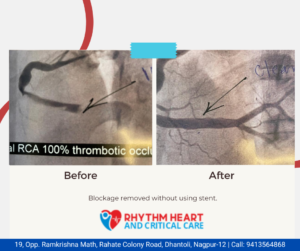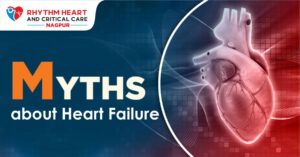A Regular Heart Checkup is crucial for maintaining good heart health and preventing serious cardiovascular diseases. The heart is one of the most vital organs in the body, and any issue with it can significantly impact overall well-being.
Many heart-related problems, such as hypertension, coronary artery disease, and arrhythmias, develop silently without any noticeable symptoms. By undergoing a Regular Heart Checkup, individuals can detect early signs of heart disease, manage risk factors effectively, and receive timely treatment.
At Rhythm Hospitals, we emphasize the importance of routine cardiac assessments to ensure a healthy heart and a better quality of life. Whether you have a family history of heart disease or are leading a stressful lifestyle, prioritizing a Regular Heart Checkup can make a significant difference in preventing complications.
This article explores the key reasons why heart checkups are essential, what they include, and how they help in early diagnosis and prevention.
Importance of Regular Heart Checkup
1. Early Detection of Heart Diseases
One of the biggest benefits of a Regular Heart Checkup is the early detection of heart diseases. Many cardiovascular conditions develop gradually, and symptoms may not appear until the disease has progressed. Routine checkups help detect issues like high cholesterol, high blood pressure, and irregular heart rhythms before they become life-threatening.
2. Prevention of Major Cardiac Events
Heart attacks and strokes are leading causes of death worldwide. Regular screening can identify risk factors such as obesity, diabetes, and high blood pressure. With early detection, doctors can provide guidance on lifestyle changes and medications to prevent serious cardiac events.
3. Monitoring Heart Health
People with existing heart conditions must closely monitor their heart health. A Regular Heart Checkup ensures that treatment plans are working effectively and helps in making necessary adjustments to medications or lifestyle changes. This monitoring is especially important for individuals who have undergone heart surgeries or have chronic conditions like hypertension.
4. Identifying Lifestyle-Related Risks
Unhealthy lifestyle habits, including smoking, excessive alcohol consumption, poor diet, and lack of exercise, significantly contribute to heart disease. A Regular Heart Checkup allows doctors to assess these risks and provide tailored advice on diet, exercise, and other lifestyle modifications to improve heart health.
5. Stress and Heart Health
Stress has a direct impact on heart health, leading to conditions like high blood pressure and increased heart rate. Routine heart check ups can help assess stress levels through heart rate variability and blood pressure readings, allowing doctors to recommend stress management techniques like meditation and yoga.
6. Family History and Genetic Risk Factors
If you have a family history of heart disease, your risk of developing similar conditions increases. A Regular Heart Checkup helps in understanding genetic predisposition and taking preventive measures to reduce the likelihood of heart-related issues.
7. Cost-Effective in the Long Run
Preventive healthcare, including regular screenings, can save money in the long run by avoiding expensive treatments, surgeries, and hospitalizations. Catching heart disease early through a Regular Heart Checkup reduces the financial burden associated with long-term treatments.
What Does a Regular Heart Checkup Include?
A comprehensive Regular Heart Checkup involves several tests and assessments to evaluate heart health. Here are some key components of a routine cardiac examination:
1. Blood Pressure Measurement
High blood pressure is a major risk factor for heart disease. Routine monitoring helps in early diagnosis and effective management.
2. Cholesterol and Lipid Profile Test
This test measures levels of LDL (bad cholesterol), HDL (good cholesterol), and triglycerides in the blood. High cholesterol levels increase the risk of heart blockages.
3. Electrocardiogram (ECG)
An ECG records the electrical activity of the heart and detects irregular heartbeats, arrhythmias, and other abnormalities.
4. Echocardiogram
An echocardiogram uses ultrasound waves to create images of the heart, helping doctors assess heart function and detect structural abnormalities.
5. Stress Test
A stress test evaluates how well the heart functions under physical exertion. It helps in diagnosing coronary artery disease and assessing overall heart fitness.
6. Blood Sugar Test
Diabetes is closely linked to heart disease. Regular monitoring of blood sugar levels is essential to prevent complications.
7. Body Mass Index (BMI) and Waist Measurement
Obesity is a major risk factor for heart disease. Doctors check BMI and waist circumference to assess weight-related risks.
Who Should Get a Regular Heart Checkup?
1. Individuals Over 40
As people age, the risk of heart disease increases. Those over 40 should undergo a Regular Heart Checkup at least once a year.
2. People with a Family History of Heart Disease
Genetic predisposition plays a significant role in heart health. Those with a family history of cardiovascular conditions should be extra cautious.
3. Diabetic and Hypertensive Patients
Diabetes and high blood pressure significantly increase the risk of heart disease. Regular monitoring helps in early intervention and effective management.
4. Individuals with a Sedentary Lifestyle
Lack of physical activity contributes to heart problems. Those leading a sedentary lifestyle should prioritize routine heart screenings.
5. Smokers and Alcohol Consumers
Smoking and excessive alcohol consumption harm the heart. A Regular Heart Checkup can help assess the impact of these habits and guide individuals towards healthier choices.
6. Those Experiencing Symptoms of Heart Problems
If you experience symptoms like chest pain, shortness of breath, dizziness, or palpitations, a Regular Heart Checkup is essential to rule out serious conditions.
Conclusion
A Regular Heart Checkup is not just for those with existing heart conditions—it is a vital preventive measure for everyone. With heart disease being one of the leading causes of death worldwide, early detection and proactive management can save lives. By prioritizing routine heart checkups, individuals can take charge of their cardiovascular health, prevent complications, and enjoy a longer, healthier life.
At Rhythm Hospitals, we are committed to providing comprehensive cardiac care with state-of-the-art diagnostic facilities and expert medical professionals. Whether you need a routine heart checkup or specialized cardiac treatment, our team is here to support you every step of the way.
Don’t wait for symptoms to appear—schedule a Regular Heart Checkup today and safeguard your heart health for the future!







